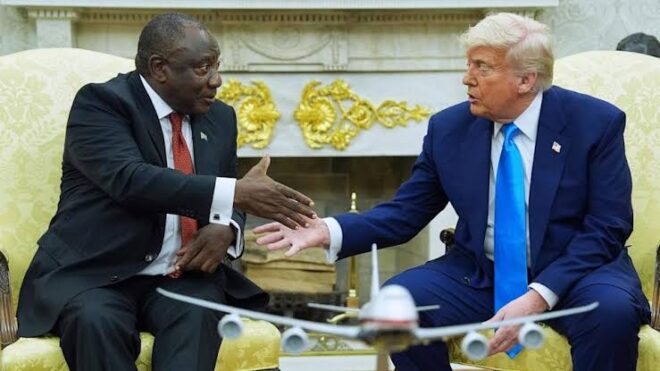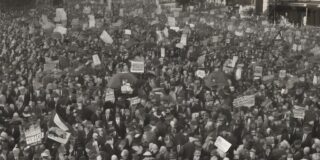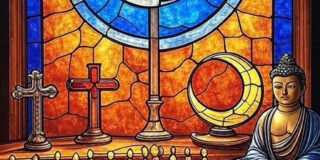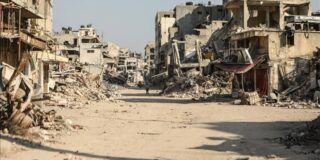
Abstract
The narrative of “white genocide” in South Africa, particularly regarding the Afrikaner community, has gained traction in recent years, particularly in the context of South Africa’s 2024 case against Israel at the International Court of Justice (ICJ). This paper examines how this narrative has been weaponised by President Donald Trump and his allies within US Christian nationalism and Christian Zionism. It argues that this weaponisation serves multiple purposes: defending Israel, undermining South Africa’s legal and moral standing and advancing an ideological agenda rooted in white Christian victimhood. Through a detailed exploration of the historical, theological and cultural dimensions of this narrative, this research reveals its implications for global politics, racial dynamics and the integrity of international law.
Introduction
The accusation of genocide against Afrikaners in South Africa, particularly in the wake of the country’s legal action against Israel, represents a politically charged narrative that has been amplified by various actors, notably former President Donald Trump. This paper seeks to explore the interplay between the “white genocide” fallacy, US Christian nationalism and Christian Zionism and how these elements have converged to manipulate public discourse and international relations.
The term “white genocide” has been used to describe a supposed systematic campaign against the Afrikaner community in South Africa, often drawing on historical grievances and contemporary socio-political issues. This narrative has gained traction in the United States, particularly among far-right groups and Christian nationalist movements, which frame it as part of a broader struggle against perceived anti-Christian and anti-white forces. The emergence of this narrative coincides with South Africa’s ICJ case against Israel, where accusations of genocide against Palestinians have sparked intense debate and controversy.
This paper will analyse the origins and implications of the “white genocide” narrative, the strategic counter-narrative surrounding South Africa’s ICJ case and the roles of US Christian nationalism and Christian Zionism in this context. Through this analysis, the paper aims to illuminate the dangers posed by the weaponisation of such narratives in global politics and the impact on social cohesion within South Africa.
The Fallacy of “White Genocide” in South Africa
Historical Context and Emergence
The “white genocide” narrative emerged in South Africa following the end of apartheid in 1994, as the country transitioned to a black-majority democracy. Proponents of this narrative argue that Afrikaners, a white ethnic group primarily descended from Dutch settlers, are facing systematic violence and dispossession. This claim often cites incidents of farm attacks, which are framed as evidence of an orchestrated campaign against Afrikaners. However, a critical examination of the evidence reveals that these assertions lack empirical support and are often exaggerated for ideological purposes.
According to the United Nations Convention on the Prevention and Punishment of the Crime of Genocide, genocide is defined as acts committed with the intent to destroy, in whole or in part, a national, ethnic, racial, or religious group. In South Africa, crime statistics indicate that farm attacks, while tragic, are largely driven by economic motivations rather than ethnic targeting. Reports from the Institute for Security Studies show that the number of farm attacks has remained relatively low, with annual murders often in the dozens within a country of over 60 million people experiencing high levels of violent crime across all communities.
The Role of Historical Grievances
The “white genocide” narrative is deeply rooted in historical grievances, such as the Anglo-Boer War (1899–1902), where Afrikaners faced significant suffering at the hands of British forces. Contemporary issues, including economic inequality and high crime rates, are often conflated with this historical trauma to construct a narrative of existential threat. The emotional potency of the “white genocide” narrative lies in its ability to exploit real incidents of violence, creating a distorted picture of coordinated persecution that resonates with specific ideological constituencies, particularly among far-right groups in the US and Europe.
Counterarguments and Critiques
Critics of the “white genocide” narrative argue that it oversimplifies complex socio-political realities in South Africa. Numerous studies highlight that farm attacks are not racially motivated, but are part of broader economic struggles faced by all South Africans. Furthermore, human rights organisations emphasise that land reform initiatives, while contentious, are aimed at addressing historical injustices rather than targeting Afrikaners as a group. The narrative’s reliance on selective evidence and exaggeration undermines its credibility and risks inflaming racial tensions within South Africa.
South Africa’s ICJ Case and the Strategic Counter-Narrative
Context of the ICJ Case
In December 2023, South Africa filed a case against Israel at the ICJ, alleging genocidal acts against Palestinians in Gaza. This legal action drew parallels between Israel’s policies and the apartheid system in South Africa, framing Israel’s actions as systematic violence and dehumanisation. The case sparked intense global debate, with Israel and its allies, including the United States, dismissing the charges as baseless and politically motivated.
Emergence of the Counter-Narrative
In response to South Africa’s ICJ case, the “white genocide” narrative resurfaced as a strategic counter-narrative, particularly among US-based actors. By accusing South Africa of enabling or ignoring genocide against Afrikaners, proponents sought to undermine its moral and legal standing. This counter-narrative is not merely a spontaneous reaction, but a calculated effort to exploit global attention surrounding the ICJ case, reframing South Africa as a perpetrator rather than an advocate for justice.
This strategic deployment of the “white genocide” narrative serves multiple purposes: it seeks to discredit South Africa’s challenge to Israel, rally support among Christian nationalists and Zionists and shift the focus away from the humanitarian crisis in Gaza. By transforming a complex legal and humanitarian debate into a polarised exchange of accusations, the narrative effectively dilutes the moral urgency surrounding the Palestinian issue.
US Christian Nationalism: The Ideological Framework
Historical Roots and Contemporary Manifestations
United States Christian nationalism is a potent ideology that merges Christian identity with American national identity, asserting that the United States is a divinely ordained Christian nation. Its historical roots can be traced back to the Puritan settlers of the 17th century and have evolved through various cultural and political movements, including the Moral Majority and the rise of evangelical conservatism.
Contemporary Christian nationalism has gained momentum, particularly during Donald Trump’s presidency. This ideology emphasises themes of Christian supremacy, national exceptionalism, cultural homogeneity and political activism, often marginalising religious minorities and promoting exclusionary policies.
Intersection with the “White Genocide” Narrative
Christian nationalism provides a broader ideological framework for the “white genocide” narrative, aligning with its themes of victimhood and persecution. By portraying Afrikaners as embattled Christians, the narrative resonates with the fears of Christian nationalists who perceive a decline in their cultural and religious dominance. This intersection amplifies the emotional appeal of the “white genocide” narrative, transforming it into a rallying cry for those who feel threatened by multiculturalism and secularism.
Christian Zionism: A Detailed Analysis
Theological Foundations
Christian Zionism is a distinct movement within evangelical Christianity that supports Israel, rooted in a belief in the fulfilment of biblical prophecy. Grounded in dispensationalist theology, Christian Zionism posits that the establishment of Israel is a prerequisite for the Second Coming of Christ. This theological framework shapes the movement’s political activism and informs its support for Israeli policies.
Cultural and Racial Dimensions
Christian Zionism intersects with racial and cultural narratives, often framing Israel’s struggles as parallel to the experiences of white Christians in the West. This cultural framing reinforces the “white genocide” narrative by portraying Afrikaners as victims in a broader struggle against anti-Christian forces. The racial undertones of the narrative resonate with anxieties about demographic decline and cultural displacement, further solidifying the alliance between Christian nationalism and Christian Zionism.
Connection to the Afrikaner Narrative
The “white genocide” narrative resonates deeply with Christian Zionists for several reasons:
1. Theological Parallel: Afrikaners are framed as persecuted Christians, akin to Israel’s status in a hostile region. This shared narrative of divine struggle reinforces the theological urgency behind Christian Zionism.
2. Moral Counterattack: Accusing South Africa of genocide serves to undermine its ICJ case, protecting Israel’s legitimacy and aligning with Christian Zionists’ theological convictions.
3. Racial and Cultural Solidarity: The narrative taps into anxieties about white Christian decline, portraying Afrikaners’ plight as parallel to perceived threats faced by Christian nationalists in the US.
4. Eschatological Urgency: The ICJ case heightens Christian Zionists’ sense of apocalyptic urgency, framing any threat to Israel as a challenge to divine prophecy.
This convergence of theology and race amplifies the “white genocide” narrative’s potency, transforming a localised issue into a global symbol of Christian nationalist and Zionist resistance.
Trump’s Cynical Weaponisation
Rhetorical Strategies
Donald Trump’s rhetoric surrounding the “white genocide” narrative exemplifies a cynical manipulation of complex socio-political realities. By threatening to “clobber” South Africa with genocide charges, Trump exploits racial fears and religious convictions to mobilise support among his base. His rhetoric mirrors the emotional weight of the term “genocide,” transforming it into a political weapon devoid of factual basis.
Implications of Trump’s Rhetoric
Trump’s weaponisation of the “white genocide” narrative serves multiple purposes: it defends Israel against South Africa’s ICJ case, galvanises support among Christian nationalists and counters progressive critiques of Israel. This approach trivialises the concept of genocide, reducing it to a rhetorical tool for political gain. The implications of this manipulation extend beyond South Africa, undermining the credibility of international legal frameworks and distorting public discourse.
Mechanics of the Weaponisation
Media Amplification
Far-right media outlets play a critical role in disseminating the “white genocide” narrative, amplifying its reach and impact. By framing isolated incidents as evidence of a coordinated campaign against Afrikaners, these outlets create a distorted perception of reality that resonates with specific ideological constituencies. Social media platforms further amplify this narrative, enabling the rapid spread of misinformation and emotive imagery.
Theological Framing
Christian Zionist leaders lend moral legitimacy to the “white genocide” narrative, framing Afrikaners as Christian martyrs in a global struggle. This theological framing enhances the narrative’s emotional appeal, aligning it with broader themes of divine struggle and persecution.
Racial and Cultural Narratives
The narrative exploits racial fears, portraying black-majority rule in South Africa as inherently chaotic or vengeful. This framing resonates with US debates over race and immigration, creating a sense of shared victimhood among white Christians. The cultural alignment of Christian Zionism with Western identity reinforces this framing, casting Israel and Afrikaners as outposts of civilisation against perceived threats.
Political Instrumentalisation
Trump and his allies use the “white genocide” narrative to achieve strategic goals, including discrediting South Africa’s ICJ case and rallying support among evangelical voters. This political instrumentalisation transforms a complex humanitarian issue into a polarised exchange of accusations, diluting the focus on critical global challenges.
Implications of the Weaponisation
South Africa’s Social Fabric
The weaponisation of the “white genocide” narrative exacerbates racial tensions within South Africa, undermining efforts at reconciliation and nation-building. By framing Afrikaners as victims, it reinforces divisive stereotypes and distracts from addressing pressing social issues affecting all South Africans.
International Law and Moral Frameworks
The trivialisation of genocide accusations risks undermining the credibility of international legal frameworks. When genocide is weaponised for political purposes, it diminishes the moral significance of the term and sets a dangerous precedent for future geopolitical disputes.
Global Polarisation
The narrative deepens divides between the global North and South, alienating potential allies in regions where South Africa’s stance on Palestine enjoys broad support. This polarisation complicates US diplomacy and reinforces perceptions of American exceptionalism and hypocrisy.
Strengthening Exclusionary Ideologies
The “white genocide” narrative strengthens the influence of Christian nationalism and Zionism, promoting an exclusionary worldview that prioritises religious and racial identity. This threatens democratic norms and erodes the foundations of pluralism in society.
Critiques and Counterarguments
Critics of the “white genocide” narrative argue that it distorts the realities of South Africa’s socio-political landscape, overlooking the complexities of crime and economic inequality. They emphasise the need for a nuanced understanding of the challenges faced by all South Africans, rather than relying on selective evidence and exaggeration.
Proponents of the narrative, however, argue that it highlights real vulnerabilities faced by Afrikaners and serves as a necessary counter to perceived hypocrisy in South Africa’s ICJ case. This debate reflects broader tensions within South African society and the global discourse surrounding race, identity and justice.
Pathways Forward
Addressing the challenges posed by the weaponisation of the “white genocide” narrative requires a concerted effort to reclaim the concept of genocide as a tool for truth and justice. Engaging with South Africa’s complexities without succumbing to divisive narratives is essential for fostering understanding and reconciliation.
Furthermore, challenging the theological and political dominance of Christian nationalism and Zionism is crucial for promoting a vision of faith that embraces compassion and inclusivity. By fostering dialogue and emphasising shared humanity, it is possible to dismantle the manipulative narratives that threaten social cohesion and justice.
Conclusion
The weaponisation of the “white genocide” fallacy by Donald Trump, US Christian nationalists and Christian Zionists represents a calculated strategy to counter South Africa’s ICJ case against Israel, defend the Jewish state’s legitimacy and advance a worldview rooted in white Christian victimhood. This manipulation polarises global discourse, exacerbates racial tensions in South Africa, undermines international law and strengthens exclusionary ideologies. The implications of this narrative extend far beyond South Africa, fuelling division and eroding the foundations of justice and pluralism.
Reclaiming the genocide framework as a tool for truth and engaging with South Africa’s complexities are essential steps in addressing this challenge. Ultimately, the “white genocide” fallacy underscores the dangers of cynicism in global politics, where truth becomes a casualty of power, ideology and eschatological zeal. Only through dialogue, evidence and a commitment to shared humanity can such manipulations be dismantled, fostering a world where justice prevails over division and hope triumphs over fear.



